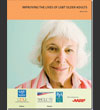News
Report - LGBT Aging Calls for Law Changes
Wednesday, March 17, 2010

LGBT senior citizens face unique social and financial problems, and lawmakers could help them by modifying Social Security and Medicaid rules, according to a national report released Wednesday in Chicago at a national conference on aging.
Tom Nelson, chief operating officer of AARP, wrote the report’s foreword and said Tuesday that his organization wanted to see the needs of LGBT seniors discussed and met.
“Whether it’s in an institution where someone’s receiving care or whether it’s some of the fundamental building blocks of retirement security like Social Security, we want to have that discussion about how you make sure people have access to those kinds of benefits,” Nelson said, according to Chicago Tribune/LA Times.
The report [pdf] calls on federal and state lawmakers to consider ways to legally recognize same-sex relationships so aging partners in a committed relationship can have equal access to the support systems that benefit heterosexual seniors. That would include Social Security survivor benefits and the rights of same-sex partners to make medical decisions for each other.
Serena Worthington, director of the SAGE (Services & Advocacy for GLBT Elders) program in Chicago, told Chicago Tribune that she routinely saw seniors at her group's twice-weekly luncheons who felt socially isolated. Some have never come out of the closet. Others were out but then moved into a nursing home and thought they had to hide their sexual identity.
“If you were coming of age when it was illegal or immoral to be gay or lesbian, you could be considered mentally ill,” Worthington said. “And now you picture seniors walking into senior centers still holding that fear of rejection. Many LGBT seniors are just not accessing social services, and so they become increasingly isolated.”
AARP’s Nelson said, “We don't want to see discrimination in care facilities. This report should help people start thinking about all the dimensions that need to be addressed in the LGBT community.”
The report was prepared in collaboration with mainstream aging organizations including AARP and the American Society on Aging by two LGBT-focused groups—SAGE and MAP (Movement Advancement Project), which is described as “a think tank that produces and disseminates research aimed at increasing the productivity of investments in the LGBT movement”.
“This is the first time that the heavyweights of the aging network are really embracing a comprehensive look at the needs of LGBT older adults,” said Michael Adams, executive director of SAGE. “We know there are anywhere from 2 to 3 million LGBT seniors in this country. We’re talking about a very significant portion of the older population in this country.”
Adams called the report “a much-needed roadmap for creating a society where all older adults are treated with dignity and respect”.
In a statement about the report, MAP’s executive director Ineke Mushovic said, “We are heartened that those who work in the field of aging are committed to improving the lives of all older Americans, and we look forward to our research and recommendations making a real difference in the lives of LGBT older adults.”
He pointed out that, contrary to stereotypes, LGBT elders are more likely to live in poverty, face social and community isolation, and lack appropriate health care and long-term care.
